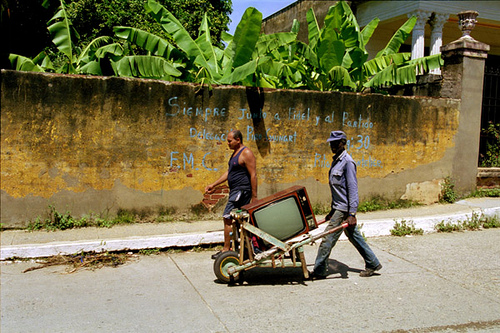
In Cuba there is no tabloid press following the famous, but many Cubans are up-to-date with gossip about artists, singers, and famous sports figures — national or foreign.
The news comes in by the “antenna”, as they call the illegal connections that permit programs transmitted by Miami channels to be seen. Lacking Internet, their access is fairly limited and expensive, a source can be magazines like “Hola” or others brought by tourists which circulate clandestinely. But the chief method continues to be “radio bemba,” also known as mouth-to-mouth.
When Fidel Castro arrived into power and eliminated newspapers and magazines, the State seized all the means of communication. With the stroke of a pen the police blotter disappeared, which had been very popular on the island. As well, on CMQ, each morning there used to be a radio program titled “The Happenings of the Day” conducted for many years by the musician and composer José Fernández Díaz, better known as Joseíto Fernández (Havana 1928-1979).
Joseíto always improvised on the same tune, the Guantanamo Guajira. Singing, he’d tell tales of blood crimes, romances, and patriotism; he would denounce social injustices, salute politicians, or promote commercial firms. In his peculiar style in 1953, Fernández pled over the radio for a general amnesty for political prisoners, finally conceded by Fulgencio Batista in May 1955, allowing Fidel and Raúl Castro to leave the Modelo Prison, on the Isla de Pinos.
Historically, Cubans enjoy knowing the insides of the artistic world and like being up-to-date with how many robberies, murders, and crimes of passion happen inside the country, including what are now the most gossiped about since before 1959. The explanation could be in the creation of the Committees for the Defense of the Revolution on September 28, 1960. The CDRs emerged to watch neighbors on their blocks and in their neighborhoods. The ‘cederistas‘ — as they are called — are experts in gossiping and snitching.
Every day, long lines form before the press kiosks, mostly retirees, who for 20 cents buy a newspaper and resell them for a peso ($0.05 dollars). But that doesn’t mean that the population is sufficiently informed; at least about certain news.
Like the relations with the opposition, for example. When we find out about them, it’s because State Security and the Communist Party have authorized their publication. Despite the manipulations and the offensive language, until now, it has been the regime charged with “popularizing” dissidence and independent journalism.
The citizenry is used to hearing about the visits of certain personalities to the island. But on occasion it doesn’t matter too much. “I saw in the news that this guy arrived who is in his own country I don’t know who. Sincerely, I’m not interested knowing who came. What I’m worried about right now is that I have to figure out food so my two children can eat lunch and dinner”, says Humberto, 38, bus driver.
Mileidy, 23, is a university student and prostitute in her free time. A good part of the cash she gets bedding tourists she dedicates to surfing the Internet from Havana’s hotels. She has a level of information above that of the media, “but as I am tired of our sufferings, I prefer to read about what’s happening in other countries and to be current about fashion, although I might not be able to buy that clothing.”
A neighbor with a son in prison for a common crime confesses that she only turns on the radio to hear music, “and the television to watch soap operas. The less one knows, the better off one is, above all if one lives with so many needs and problems.” Another neighbor, who also asked for anonymity, was more explicit:
“At times, when my family calls me from Miami, they ask me about a series of dissidents and political prisoners, about those women dressed in white or about those bloggers. And I tell them the truth, that here we barely know about ‘those human rights people’, as they call the government opposition in the street. I can’t complain, because they send me 100 dollars every month, but the immense majority of Cubans will do anything to survive. If the chief cause in your life is to track down a plate of food, a bar of soap to bathe yourself with, or a pair of tennis shoes for your child, that kind of news doesn’t matter.”
The day-to-day lives of Cubans on the island are very distinct from those of the Cubans who live in other nations. For some, the news could be the WikiLeaks cables about Cuba. For others, the news is that the television is broken, and you have to fashion some kind of cart to take it to be repaired.
Translated by: JT
February 22 2011
